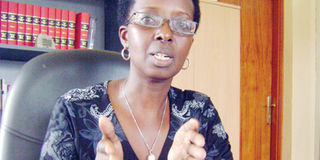Allen the tax collector and mother

Ms Kagina
What you need to know:
Some of Kagina’s accomplishments
- As Commissioner General, she has transformed the tax body into a more respectable and professional organisation. The assignment called for sweeping reforms that involved restructuring of the organisation and rebranding. Then, there was a constant interaction with the public and sensitisation on the importance of paying taxes-this has also improved greatly.
- Later, automation and ICT came in handy. Since then the organisation has not looked back as revenue collections have grown over the years.
- Kagina spends her free time with her family. She also enjoys reading books
In a world dominated by men, especially many of them doing bad things, it is refreshing to stumble upon those of the fair sex doing what men do and doing it better. Her colleagues refer to her simply as CG or by her first name – Allen.
The public she serves have, understandably, mixed attitudes towards her but that is because of what she does – tax them. But in the corridors of her organisation – the Uganda Revenue Authority – Commissioner General Allen Kagina is an inspiration who has strived to achieve where many would have failed.
Her drive for success is borne from her belief that life is belief in one’s own capacity. “My belief in life is that there is no challenge that will strike which I am not equipped to overcome it. One of the things I am often asked is how I manage to succeed in a man’s world? This is actually not a man’s world, it is for both men and women and there is no job that a man does in the corporate world that a woman cannot do as long as you are equipped and trained,” she offers.
The 8th child in the family of ten; Kagina attended Gayaza High School, joined Makerere University and studied Psychology, and later a Masters in Public Administration at the University of Liverpool in the UK.
Kagina set off her working career in 1985 teaching at MUK as tutorial assistant. Three years later, she joined the public service where she worked in the office of the president until 1992 when she joined Uganda Revenue Authority.
When she became URA’s boss in 2004, it was to be a turning point in what she is capable of, especially leading an organization that suffered an acute reputational problem.
She joined URA as a senior revenue officer from where she rose through anumber of ranks; principal revenue officer, assistant commissioner, deputy commissioner, commissioner to commissioner general.
“It’s been an exciting, challenging and rewarding 18-year journey at URA. And if you track the progress there has been a significant change not only in revenue terms, but in services offered by URA to the public as well and it has been an adventure for me,” she says.
On her earlier years at the tax body Ms Kagina says: “This period was challenging especially in tax compliance and corruption. We were collecting less than 50 per cent of the national budget as URA.”
In 2000, as deputy commissioner of a new division of customs, Kagina dealt with the technical issues that involved laws, procedures, tariff classifications and disputes.
In 2001, she became a commissioner in charge of customs when her boss passed on.
“Having been in this department for some time, there were things that I thought could be streamlined and others be implemented and this was an opportunity for me to overhaul the systems,” she says. “We did not have a good relationship with the clearing agents. We used to view each other with suspicion and that was not good for revenue collection,” says the mother of three.
She began building strong linkages with the clearing agents and the tax community through meetings and involving them in licensing and hearing out their challenges in paying taxes. This interaction, she says, helped URA review their services to meet the needs of the public and community and this translated into higher revenue collections.
As Commissioner General, her first assignment was to transform the tax body into a more respectable and professional organisation. The assignment called for sweeping reforms that involved restructuring of the organisation and rebranding. Then, there was a constant interaction with the public and sensitisation on the importance of paying taxes.
Later among others, automation and ICT came in handy. Since then the organisation has not looked back as revenue collection has remarkably improved. Since 2004/5 URA net collection increased from a mere Shs1.9 trillion against the target of Shs1.8 trillion, to the current Shs4.4 trillion.
But amidst her busy schedule, how does she meet her family needs?
“I need time to devote to my family and work too. When I am in the office I must be fully at the service of URA. These are challenges all working women face,” she says adding: “Because I am born-again I lean on God, I pray and have a good prayer team; this helps me cope.”
With her contract ending on October 31, she has no regrets about what she has done.
“In case my contract is not renewed I am confident that the legacy I leave behind is a URA, which can run without Allen Kagina and by all indications right now I think I have done my job.”
“This is because the systems I have been built, the people are trained, management is fully in charge; so URA can certainly do without me because it’s now a strong organisation. URA is so transformed that it’s attracting other African countries to come and see what we have done.”




